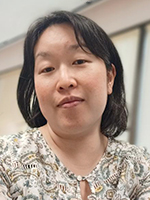
Our experts highlight the connection between nutrition, well-being and community health.
We know that a nutritious diet plays a key role in good health, but eating well is about more than just meeting physical needs. Healthy eating is a deeply personal journey that supports emotional well-being, strengthens social connections and empowers thriving communities. Vancouver Coastal Health Research Institute (VCHRI) Knowledge Translation Challenge recipient Joyce Wong and VCH regional public health dietitian Helen Yeung share evidence-based tips on how to adapt healthy eating habits to individual life experiences and explain why promoting food security is essential for overall well-being.
Q: What is healthy eating?
A: Healthy eating is a pattern of eating that contributes to the best possible health. This includes having a positive relationship with food and making diverse, balanced food choices that meet your individual nutrient and energy needs. Healthy eating looks different for everyone and is shaped by factors including access, availability, personal preferences, culture and family traditions.
There is no one-size-fits-all approach to healthy eating. One person’s goal might be to replace an afternoon chocolate bar with fruit, while another might aim to eat together more often with family members. The key is to find an approach that fits your lifestyle and supports your long-term health.
Q: How does eating well support both physical health and emotional well-being?
A: Eating a variety of nutritious foods every day is central to healthy eating and will help meet nutrient requirements. Nutrient recommendations differ based on age, sex, activity level, health conditions and other factors. However, what matters most is not what you eat on a single day, but rather your overall pattern of eating over time.

Taking time to savour food and engage your senses can enhance mindfulness and overall satisfaction. Cooking more often is also a great way to develop new skills, try different foods and improve your nutrition.
Q: How do sugary foods and beverages fit into a balanced diet?
A: When it comes to sugar, or any other food item, the healthiest approach is balance and flexibility. Sugary foods and beverages can be a part of an enjoyable, healthy diet when consumed in moderation alongside other nutritious choices. Canada’s Food Guide recommends making water your drink of choice to help reduce the health risks linked to sugary beverages. Rather than focusing on restriction, consider an approach that prioritizes variety, moderation and enjoyment.
Q: How do social factors influence eating habits?
A: What we eat is shaped by more than just personal preferences — it is also influenced by social, economic and environmental factors. A person’s income, health, life experiences and cultural background all play a role in their food choices.
At the community level, access to grocery stores, affordable food options and culturally relevant resources can affect how easy it is to maintain healthy eating patterns. On a broader scale, systemic issues such as income inequality, racism and the ongoing harms of colonialism create barriers that determine who has access to nutritious food and who does not.
Q: Why is it important for public health policies prioritize inclusivity, trauma-informed care and cultural safety to address food security and food sovereignty?
A: Food insecurity — the lack of reliable access to enough nutritious food — disproportionately affects low-income households, single parents, Indigenous communities, newcomers, people living with disabilities and individuals experiencing housing instability.
For Indigenous communities, food insecurity is deeply connected to food sovereignty — the ability to access and use traditional foods. Colonial policies and systemic barriers have disrupted these food systems, limiting access to traditional lands, practices and resources. Supporting Indigenous food sovereignty is an essential step toward strengthening food security and improving overall health.
Many individuals experiencing food insecurity hesitate to seek support due to stigma, discrimination or systemic barriers. Public health efforts must be inclusive and culturally safe to ensure that all individuals feel safe and empowered when accessing services.
Q: Where can I find trusted nutrition resources?
A: Canada’s Food Guide is an accessible public resource, offering meal planning tips, recipes and guidance tailored for different age groups. The plate visual in the Food Guide’s Snapshot shows examples of foods. While the guide provides a helpful framework, it’s important to remember that healthy eating is diverse. There are many types of foods that are prepared, served and eaten in different ways that can be part of a healthy diet, including cultural, ethnic and traditional foods.
For personalized advice, Healthlink BC’s Dietitian Services offers free access to registered dietitians who can answer food- and nutrition-related questions.




